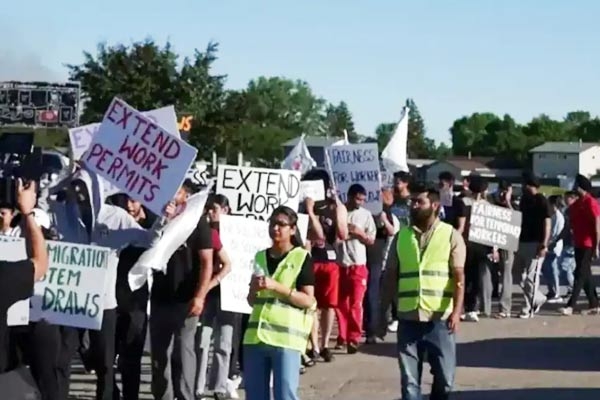Indian students are facing deportation and are struggling in Canada
August 28, 2024 20:05
(Image source from: x.com)
More than 70,000 graduate students across Canada are at risk of deportation due to recent changes in federal immigration policy. Protests are spreading across Canadian cities as international students and skilled workers stand up for their rights and demand changes to immigration policies that determine whether they face deportation in the countries they call home. From the busy streets of Ontario to the beautiful countryside of Prince Edward Island (PEI), these protesters came to Canada with the promise of a better future, but found themselves caught in a web of bureaucracy. The situation is particularly exacerbated by the state's new policy of reducing green card recommendations by 25 percent. This was the case in PEI, where several Indian students were forced to return home. Indian student protests spread to four Canadian provinces: Ontario, Manitoba, Prince Edward Island (PEI) and British Columbia (BC). The unrest first began in May in P.E.I.
It's no secret that in Canada, many students have enrolled in private universities due to the easy naturalization process. Hundreds of thousands of Indian students dreaming of immigrating to North America or Europe have chosen the student visa route. The Canadian government has always been aware of this but allowed large-scale immigration as students also contributed to the gig economy. According to India's Ministry of Foreign Affairs, there are currently about 2.8 million Indians living in Canada, including 1.8 million people of Indian descent. According to Statista, the number of Indians in Canada has increased from about 670,000 in 2000 to over a million in 2020. The growing number of international students is putting significant pressure on Canada's housing, healthcare and other services. Prime Minister Justin Trudeau's government launched a sudden crackdown as Canadians protested pressure on housing and hospitals caused by an influx of immigrants. To accommodate this growth, we have set a two-year limit. According to Immigration, Refugees and Citizenship Canada (IRCC), the cap is expected to result in the approval of approximately 360,000 study permits in 2024, a 35 per cent decrease from last year.
From June 21, foreigners will no longer be able to apply for Post Graduate Work Permits (PGWP) at the border, Immigration, Refugees and Citizenship Minister Mark Miller announced. The decision targets “flag voting,” where temporary residents leave and re-enter Canada to facilitate their work or study permit applications. PGWP is very important for international students looking for work or permanent residence. Demonstrations are taking place all over the United States and students are protesting. Just two days ago, on August 26, Canadian Prime Minister Justin Trudeau also announced that the number of temporary foreign workers employed in Canada would decrease. The Government of Canada will stop processing Labor Market Impact Assessments (LMIAs) for low-wage workers in areas with an unemployment rate of 6 percent or higher, excluding occupations in agriculture, food processing, construction and agriculture. and health care.
Employers can now hire up to 10 percent of their workforce through the low-wage Temporary Foreign Worker Program, below previous limits. In addition, the maximum period of employment for these workers will be reduced from the current two years to one year. According to Statista, India will provide 26,495 temporary foreign workers to Canada in 2023 through the Temporary Foreign Worker Program (TFWP), making it the second largest supplier of foreign workers after Mexico. According to Statistics Canada, Canada's population in 2023 exceeded the 41 million mark in the first quarter of 2024, reaching 41,012,563 on April 1, 2024. “I came to Canada for six years, worked, paid taxes and scored enough CRS points,” Mahakdeep Singh, an international student, told Toronto City News that they were facing deportation. Singh, who funded his education with his family's savings, now faces a daunting deadline without being guaranteed permanent residency.
Students who came to Canada in hopes of starting a new life are currently protesting across the country against the Justin Trudeau government's decision to restrict study permits and limit opportunities for permanent residency. This is what they want from the Canadian government. International students are calling on the government to extend work permits for graduates, create a clear and consistent path to permanent residency, and address systemic problems that contribute to exploitation. One of the main issues fueling these protests is the demand for more slots for the Provincial Nominee Program (PNP). The PNP allows provinces and territories to nominate individuals for permanent residency based on their skills, work experience and potential to contribute to the local economy.
However, the number of slots available is limited and competition is high. Prince Edward Island (PEI), Canada's smallest province, announced a 25% cut in admissions, sparking widespread protests by hundreds of Indian students who now face expulsion. The student movement started on May 18 and is still active after 110 days. They argue that sudden changes in Canadian provinces' immigration policies have made their future uncertain. Another major concern for international students and temporary workers is the expiration date of their work permit. After completing their studies, many international students are eligible for a Post-Graduate Work Permit (PGWP), which allows them to gain valuable Canadian work experience. This is an important requirement for many immigration routes, including the PNP. However, PGWPs are time-limited and typically last between eight months and three years. If a student fails to secure permanent residency within this period, they may have to leave Canada. In Manitoba, fear that work permits will expire before they can become permanent residents is adding to feelings of desperation.









